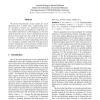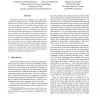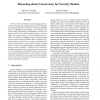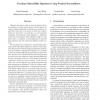143
click to vote
CSFW
2007
IEEE
15 years 6 months ago
2007
IEEE
We present interpretations of type systems for secure information flow in Hoare logic, complementing previous encodings in binary (e.g. relational) program logics. Treating base-l...
107
click to vote
CSFW
2007
IEEE
15 years 6 months ago
2007
IEEE
We consider the problem of statically verifying the conformance of the code of a system to an explicit authorization policy. In a distributed setting, some part of the system may ...
139
click to vote
CSFW
2007
IEEE
15 years 6 months ago
2007
IEEE
Noninterference is typically used as a baseline security policy to formalize confidentiality of secret information manipulated by a program. In contrast to static checking of noni...
128
click to vote
CSFW
2007
IEEE
15 years 8 months ago
2007
IEEE
Most model checking techniques for security protocols make a number of simplifying assumptions on the protocol and/or on its execution environment that prevent their applicability...
CSFW
2007
IEEE
15 years 8 months ago
2007
IEEE
Collaboration among organizations or individuals is common. While these participants are often unwilling to share all their information with each other, some information sharing i...
120
click to vote
CSFW
2007
IEEE
15 years 8 months ago
2007
IEEE
Randomized protocols for hiding private information can often be regarded as noisy channels in the informationtheoretic sense, and the inference of the concealed information can b...
CSFW
2007
IEEE
15 years 8 months ago
2007
IEEE
In this paper we focus on tackling the insecurity problem of security protocols in the presence of an unbounded number of data such as nonces or session keys. First, we pinpoint f...
111
click to vote
CSFW
2007
IEEE
15 years 8 months ago
2007
IEEE
There has been excellent progress on languages for rigorously describing key exchange protocols and techniques for proving that the network security tunnels they establish preserv...
125
click to vote
CSFW
2007
IEEE
15 years 8 months ago
2007
IEEE
Signature-based tools such as network intrusion detection systems are widely used to protect critical systems. Automatic signature generation techniques are needed to enable these...
119
click to vote
CSFW
2007
IEEE
15 years 8 months ago
2007
IEEE
mplementations for Typed Session Abstractions Ricardo Corin1,2,3 Pierre-Malo Deni´elou1,2 C´edric Fournet1,2 Karthikeyan Bhargavan1,2 James Leifer1 1 MSR-INRIA Joint Centre 2 Mic...




